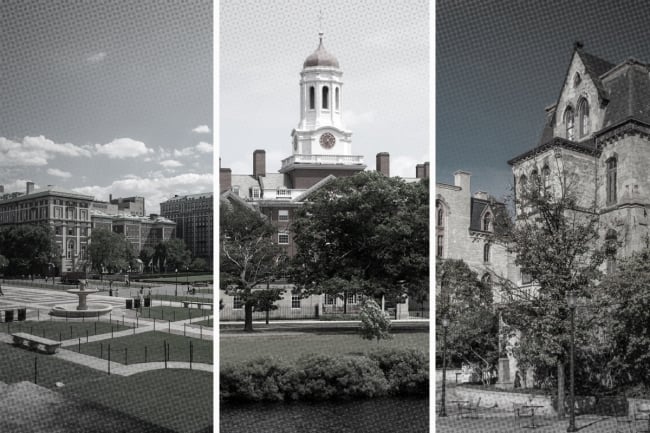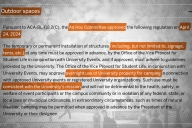You have /5 articles left.
Sign up for a free account or log in.

Columbia, Harvard and Penn are all under pressure from donors regarding how leaders should respond to campus clashes over the Israel-Hamas war and allegations of antisemitism.
Photo illustration by Justin Morrison/Inside Higher Ed | Getty Images
Weeks into the war between Israel and Hamas, conflict continues to spill onto campuses in the US. Among other things, numerous high-profile donors have threatened to close their checkbooks over how college presidents are—or aren’t—communicating about a complicated geopolitical issue thousands of miles away.
Donors, mainly to highly selective institutions, have accused those institutions’ presidents of failing to condemn Hamas soon or forcefully enough for the Oct. 7 attacks on Israeli civilians. Some donors have demanded the resignation of presidents they believe have not adequately addressed the war. Others have accused colleges of allowing antisemitism to go unchecked on campus, particularly in relation to student protests and support for Palestinians.
At the heart of those tensions lie a few questions: How much influence do donors exert over the institutions they support? And what, if anything, do those institutions owe them?
Donors Demand Action
One of the most visible cases of donor outrage occurred at the University of Pennsylvania, where President Liz Magill has been under fire for what critics consider a failure to condemn antisemitism—even before Hamas attacked Israel early last month.
Initial tensions date to a Palestinian literary festival held at Penn in September. Roger Waters, best known as the former front man for the rock band Pink Floyd, was among the speakers who prompted outrage from Jewish organizations, which cited his history of using antisemitic tropes and appearing in Nazi-like garb. (Waters has claimed that his antics are a statement against fascism.)
In a letter to the president, the Anti-Defamation League raised concerns about Waters’s inclusion, prompting a letter from Magill and a statement from Penn simultaneously condemning antisemitism and emphasizing “the free exchange of ideas as central to our educational mission,” even when such views may be controversial and “incompatible with our institutional values.”
With donors and Jewish organizations already upset, Magill’s statement following the Hamas attacks on Israel only seemed to fan the flames. The president drew criticism for not condemning Hamas, which led to a second statement in which Magill condemned Hamas, writing that “we should have moved faster to share our position strongly and more broadly with the Penn community.”
But by the time the second statement arrived on Oct. 15, trustee Vahan H. Gureghian had already resigned, alleging antisemitism was going unchecked at Penn, and various donors had decamped from the university. Among them: Marc Rowan, CEO of Apollo Global Management; billionaire cosmetics heir Ronald Lauder; and the Huntsman Foundation.
Amid ongoing calls for Magill’s resignation, Penn has sought to perform damage control; on Wednesday the university announced a plan to combat antisemitism, which includes increasing safety resources, expanding education and training programs, and establishing broader partnerships with outside Jewish organizations.
Penn isn’t the only institution facing a donor revolt; Harvard University has also landed in the spotlight for similar reasons. Much of the controversy at Harvard stemmed from an open letter signed by dozens of student organizations stating that Israel was “entirely responsible for all unfolding violence.” When Harvard president Claudine Gay failed to denounce the letter in the wake of the attack, outrage ensued.
Former Harvard president Lawrence Summers—as well as Republican U.S. senators Ted Cruz and Mitt Romney, both alumni—called on Gay to do more to crack down on antisemitism on campus, pointing to actions by students that they argue have made Jewish students feel unsafe.
“The expressions of hate and vitriol against Jews have continued and strengthened over the last week on Harvard’s campuses. The threatening, violent protests by pro-Palestinian groups on Harvard campuses become more heinous with each passing day,” read an open letter signed by Romney and Seth Klarman—a donor with a building on Harvard’s campus named after him—among others.
Harvard has also lost donors, including the Wexner Foundation, over concerns about campus antisemitism. And billionaire Ken Griffin, founder of Citadel, who has donated hundreds of millions of dollars to Harvard and has a graduate school named for him, has called for a stronger response from university leaders, though he has not said that he is cutting off financial support.
Columbia University, too, has seen at least one major donor defect over campus climate concerns. Billionaire Leon Cooperman told Fox Business that he will no longer donate to his alma mater, despite pumping an estimated $50 million into the institution over the years. Columbia has postponed its annual Giving Day fundraiser amid the ongoing tumult.
Neither Harvard, Penn nor Columbia responded to requests for comment from Inside Higher Ed.
Managing Donor Expectations
Massive donations often come with expectations to match. And as fighting between Israel and Hamas continues, big-name donors are making it clear that they want university leaders to act in ways that align with their values—or access to their fortunes will dry up.
But donor-relations experts suggest that such expectations are neither realistic nor appropriate.
“What does a big check entitle you to from a university or any other organization? It entitles you to a nice thank-you. And when there are conditions attached to the gift, it entitles you to those conditions,” said Doug White, a philanthropy adviser who has written about donor relations.
While donors have a right to specify how a gift may be used or to insist that universities honor certain conditions, such as naming a building or a school for a donor, White suggests that philanthropists are not entitled to dictate institutional policy or decisions. That type of influence, he argues, can undermine the broader mission of a university.
Isaac Kamola, a political science professor at Trinity College who studies donor influence in higher education, said philanthropists should take a hands-off approach regarding institutional missions.
“Other than being exceptionally rich, most donors have no academic expertise,” Kamola wrote in an email. “As such, they should be free to fund general areas they have a personal interest in—Medieval history or fighting cancer, for example—but should come nowhere near decisions about what gets taught, or researched, which faculty are hired, what programming takes place, much less the statements universities make or how they discipline their students.”
He added that donors have exercised more influence in recent years as higher education becomes more dependent on private philanthropy. And while that influence is often implicit, “university presidents live under the sword of Damocles,” fearful that deep-pocketed donors will walk away over “something a faculty member says or a statement a student group makes.”
Penn faculty members have also expressed concern about donor influence. The Penn chapter of the American Association of University Professors has warned that academic freedom is under threat at the institution, releasing a statement last month raising concerns about the “coercive power that trustees and donors are exercising over academic matters that are the purview of faculty.” The letter mentions donors 23 times, arguing that they have exercised undue influence on campus while also chastising administrators for failing to adequately push back on outside forces.
In many ways, the outspoken public pushback by donors is unparalleled in recent memory.
Some experts have drawn parallels between the Israel-Hamas war and the 2020 murder of George Floyd or Russia’s invasion of Ukraine in 2022, both of which stoked tensions on campus and required college leaders to navigate major political issues. But neither Floyd nor Ukraine—nor the presidential statements they generated—energized or infuriated college donors the way the current war has.
White said he could not recall a similar scenario that prompted such broad donor backlash. This case is unique given the complexity of the circumstances, he suggested—that Israel has a right to defend itself while also being subject to valid critiques about its treatment of Palestinians.
Kamola suggests the war in Gaza has become a “perfect storm” for donors to assert their power.
“Decades of dependency on philanthropic giving has weakened academic institutions, meaning that a highly polarizing event like this one can leave them particularly vulnerable to efforts by wealthy individuals to shape campus speech,” he wrote. “Donor influence takes place on college campuses all the time. However, in the current moment, it has become particularly explicit and dramatic.”








